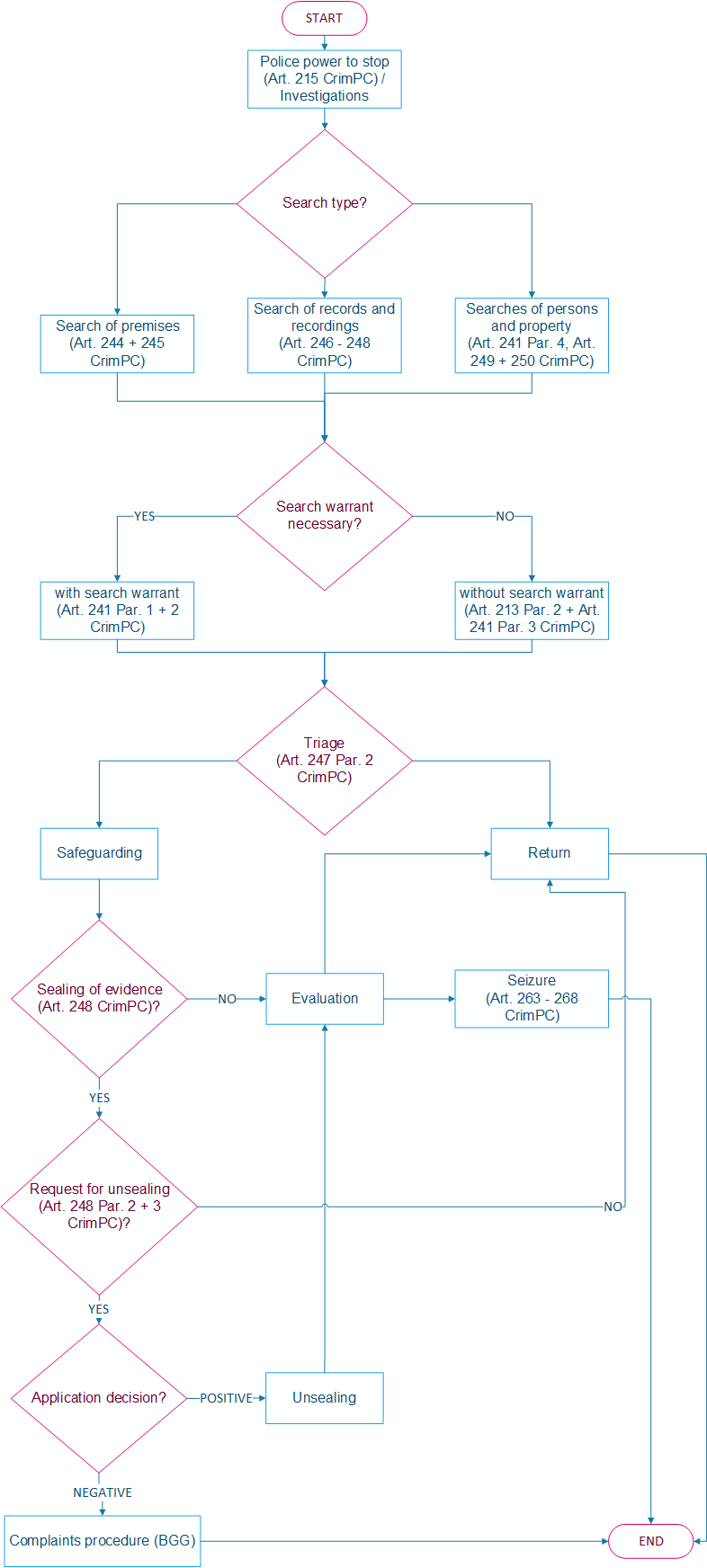From crisis to opportunity
Michèle Trebo

How Sealing of Evidence works in Criminal Proceedings
Sealing of evidence as an immediate measure guarantees that the criminal authorities neither see nor use seized objects and/or records. How exactly sealing of evidence occurs and how it can be lifted is discussed in the following sections.
Within the framework of the police stop, the police are entitled, without an order or without a search warrant from the public prosecutor’s office, to stop a person, establish his or her identity, briefly question him or her, clarify whether he or she has committed a criminal offence and whether he or she or objects in his or her custody are wanted, and may take him or her to the police station if necessary. The person stopped is obliged to give his or her personal details, to produce identification papers, to show any property he or she has brought with him or her and to open any containers or vehicles.

The Code of Criminal Procedure provides for different types of searches. It distinguishes between house searches, searches of records and searches of persons and objects. In order for the police to be allowed to conduct searches, they basically need a written search warrant from the public prosecutor’s office. However, as described in the practical examples below, there are exceptions.
An electronics shop notices that more and more sales material has been disappearing recently and calls in the police. On one of the surveillance recordings it can be seen how an employee takes a reflex camera from the shelf and goes to the employees’ changing room with it. Shortly afterwards it can be seen that the person leaves the changing room again without the SLR camera. After checking the shift schedule, the police find that the shifts of this employed person coincide with the disappearance of the sales material. The police then contact the public prosecutor’s office in charge and ask for a search warrant. They suspect evidence at the residence, on electronic devices and in the wardrobe of the accused person. Since only the management of the electronics shop and the police know about the investigation, i.e. there is no imminent danger, the police wait for the written search warrant from the public prosecutor’s office and then plan the searches.
If, when stopping a person, the police find several small mini-grip bags with white powder contents, a large sum of cash and several mobile phones in his or her pocket, they seize the items on suspicion of a violation of the Narcotics Act and take the accused person to the police station. As the police suspect further evidence in the flat of the accused person, they ask the public prosecutor’s office for a search warrant. Since there is a danger that a possible accomplice has already learned of the accused person’s arrest and thus evidence is endangered, the public prosecutor’s office gives the police an oral search warrant and submits it in written form. This allows the police to search the accused person’s premises immediately after his arrest without having to wait for the written search warrant from the public prosecutor’s office.
A woman dials the police emergency number at two o’clock in the morning and reports that her four-year-old daughter is no longer in her bed. She said she was very worried because her violent husband and she had had a heated argument the night before regarding custody of their daughter and he had threatened to take her daughter away from her. He had said that he wanted to take her abroad. Her husband and she were separated and he was now living in a flat about an hour away from her. However, he still had the key to her flat. While one police patrol goes to the mother’s place of residence, the second patrol goes to the new place of residence of the child’s father. When they arrive at the father’s flat, no one opens the door. Suddenly, the police patrol hears a crying child. Since this crying seems to come from the suspect’s flat and he is already known for his propensity for violence, the police officials decide to kick in the flat door. Since in this case the four-year-old child could be in danger, thus there is danger in delay, the police patrol is allowed to enter the flat without a search warrant. They inform the public prosecutor’s office immediately after they have brought the situation under control.
If, during a search, the police find objects and/or records that could be of importance as evidence in criminal proceedings, they seize them. It is sufficient for a seizure if, among other things, evidence is suspected on a data carrier that cannot be sighted on the spot. Objects and/or records that can clearly be excluded as evidence are left with the person.
If a person does not want his or her seized objects and/or records to be seized and viewed, he or she may request sealing of evidence. In this case, the police take the seizures but are not allowed to evaluate them. The public prosecutor’s office has 20 days to decide whether it wants to file an application for unsealing with the compulsory measures court. However, since the seizures of the police usually contain traces relevant to the criminal proceedings, the public prosecutor’s office decides in favour of the application for unsealing in the most frequent cases. However, if it still happens that the public prosecutor’s office does not apply for unsealing, the seizures will be returned to the person. If the person does not apply for sealing of evidence, the seizures are evaluated. Depending on whether the seizures are found to be relevant to the criminal proceedings or not, they will be seized or returned.
If the Coercive Measures Court decides in favour of unsealing, the seizures are evaluated and either seized or returned to the person. If the compulsory measures court rejects the prosecution’s application for unsealing, appeal proceedings may be initiated.
If the criminal authority suspects a person to be seized and/or evidence, it has the right to conduct searches and seize evidence. The person who owns the seized property may request sealing of evidence if he or she wishes to prevent the criminal authorities from evaluating the objects and/or records. The sealing may be lifted by the compulsory measures court at the request of the public prosecutor’s office and the evidence released for evaluation.
Our experts will get in contact with you!

Michèle Trebo

Michèle Trebo

Michèle Trebo

Michèle Trebo
Our experts will get in contact with you!